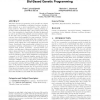4 search results - page 1 / 1 » Problem decomposition using indirect reciprocity in evolved ... |
GECCO
2009
Springer
13 years 9 months ago
2009
Springer
Evolutionary problem decomposition techniques divide a complex problem into simpler subproblems, evolve individuals to produce subcomponents that solve the subproblems, and then a...
CEC
2005
IEEE
13 years 6 months ago
2005
IEEE
Abstract- Decomposing a complex computational problem into sub-problems, which are computationally simpler to solve individually and which can be combined to produce a solution to ...
GECCO
2008
Springer
13 years 5 months ago
2008
Springer
Bid-based Genetic Programming (GP) provides an elegant mechanism for facilitating cooperative problem decomposition without an a priori specification of the number of team member...
GECCO
2007
Springer
13 years 10 months ago
2007
Springer
Crucial to the more widespread use of evolutionary computation techniques is the ability to scale up to handle complex problems. In the field of genetic programming, a number of d...


